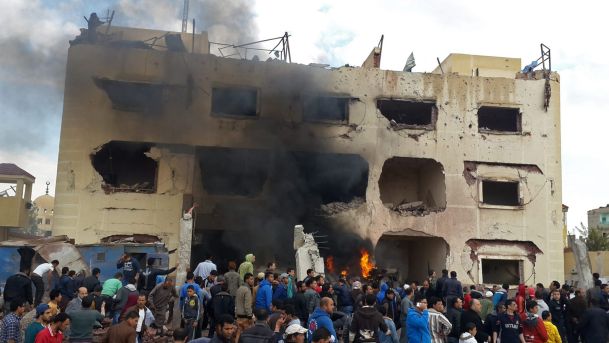His family village of Rawda was supposed to be a sanctuary for Suleiman after he fled fighting between security forces and Islamic extremists elsewhere in Egypt’s northern Sinai region.
The slaughter is the most deadly example of how Islamic State-inspired militants are extending their geographical reach and switching to more mass-casualty assaults on civilians as the jihadist group faces defeat in Syria and Iraq. Sufi Muslims, considered heretics by jihadists, were finishing noon prayers when the gunmen opened fire on them on Friday.

Returning Fighters
The grisly nature of the attack has raised concerns among locals that battle-hardened fighters from Syria and Iraq are joining their brethren in north Sinai.
It has also raised the prospect of more attacks in the heart of Egypt, the most populous Arab nation. The country is pivotal in the battle against jihadi groups and is seeking to restore its role as regional troubleshooter.
“Because Iraq and Syria are falling apart as places where they can operate this way, it is very likely you’re going to have people coming to Sinai,” said HA Hellyer, senior non-resident fellow at the Atlantic Council and the Royal United Services Institute in London. “After this, anything is a target. The question now is going to be capacity. We don’t know what their capacity is outside Sinai.”
Over the past 12 months, the group has increasingly turned its guns on civilians and expanded its reach from a small and remote area near the Gaza border. It has moved westwards toward Egypt proper and down towards mountainous central Sinai, inching closer to the Red Sea resorts that were once a pillar of the economy.
The local Islamic State affiliate has bombed churches in Cairo and Alexandria. It has sought, with limited success, to enforce its moral code in north Sinai, establishing a religious police that has targeted cigarette-sellers and demanded women cover up. It has also attacked Sufi shrines and beheaded preachers.
Sisi’s Challenge
Last week’s carnage in Rawda, among the deadliest worldwide this year, raised questions about the effectiveness of President Abdel-Fattah El-Sisi’s strategy and concerns that north Sinai is slipping into lawlessness despite a severe crackdown.
The area has become a no-go zone with heavily-reinforced checkpoints along the main highway that have made it difficult for locals to move around. The military has destroyed thousands of tunnels once used to circumvent border closures and smuggle everything from cars to weapons. It razed hundreds of homes near the border to create a security cordon and conducts regular airstrikes against suspected militants.
But militant attacks have become more daring. In late 2015, Islamic State bombed a plane carrying Russian holidaymakers home from south Sinai’s Sharm El-Sheikh, decimating tourism as El-Sisi sought to revive an economy hit by the 2011 Arab Spring uprising.
Locals mourning the dead and tending the wounded in the city of Ismailiya said it took over an hour for security forces to arrive on Friday.
“There’s no security. There’s a checkpoint one side of us, a checkpoint the other, but they put hapless soldiers there, not a strong force. Don’t let the images deceive you,” said Salha Silim, 65, who lost five relatives and was in Ismailiya hospital to care for her wounded teenage nephew. “They need to send guards because this has become a war. We’ve become a village of widows.”
Tribal Lands
Keeping order in Sinai is no easy task, where overlapping tribal and political loyalties complicate the situation.
Islamic State’s efforts to take territory in north Sinai have failed. However, it has assassinated locals accused of working with the army and the Sufis of the Jeriria Ahmadia Order who frequented the Rawda mosque are known to be government loyalists.

“IS wants to show it has authority in northern Sinai,” said Zack Gold, non-resident fellow at Atlantic Council’s Hariri Center. “It doesn’t. But neither does anyone else.”
Speaking with difficulty due to his wounds, Suleiman said the gunman, whose accent suggested he was a Sinai Bedouin, asked a superior if he should liquidate everyone in the mosque. The superior, whose accent suggested he was not a Bedouin, said to target younger men. Witnesses said gunmen opened fire on the congregation, then picked off survivors.
Suleiman fled the town of Sheikh Zuweid near northern Sinai’s border with Gaza as fighting between Egyptian security forces and a local Islamic State affiliate left the area uninhabitable. He joined relatives in Rawda, more than 60 kilometers (37 miles) west, a few years ago.
“We left Sheikh Zuweid because the atmosphere changed. They started setting up checkpoints and asking for ID and if they wanted you they would take you,” said Suleiman. “We went to Rawda because we had family there. Now they are dead.”

